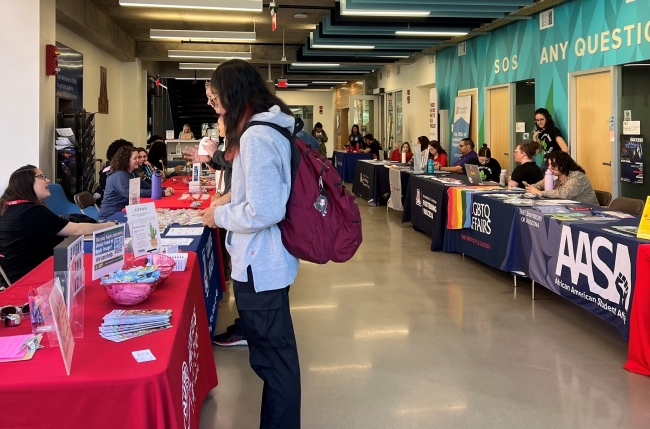You have /5 articles left.
Sign up for a free account or log in.

Students can engage with a variety of different support offices during the Spring Pause event at the University of Arizona.
Jenny Nirh/University of Arizona
Three in five college students are unaware of the full range of resources offered by their college or university, according to July 2023 research from Tyton Partners.
Many institutions work to get information to their students at the start of the academic term, giving learners ample opportunity to engage with and utilize services. At the University of Arizona, staff designed a mid-semester event for students to address concerns and refocus their efforts before the end of the term.
Spring Pause draws on various campus stakeholders to provide holistic support to learners, including advising, housing, career preparation, academics, and health and wellness. Students could meet with staff or peer leaders and identify where they need help, providing a warm handoff and direct connections.
So What?
Student support services help a learner not only address present concerns, but also build toward future retention and persistence. A September report from Tyton Partners found, on average, students with stronger feelings of belonging to their college or university utilize more student support services than their peers.
The background: Typically, resource fairs take place during orientation or the first week of classes as students are starting the term. However, some students—particularly in their first year—may need additional support later in the semester that they did not recognize at first, explains Jenny Nirh, director of collaboration, communications and outreach of Student Success and Retention Innovation.
“I think at this point, they know what they’re confused about,” Nirh says. “Midway through [students] start thinking, ‘maybe I do need more support.’”
Nirh and her team saw a need to get students involved throughout the year and provide a space for them to plan out next steps for the upcoming term and created the spring and small pause events.
How it works: The Student Success and Retention Innovation staff first hosted the event, a Fall Pause, in November 2022, inviting a dozen or so campus partners to come for an afternoon and engage with students.
This spring, the event took place from 10 a.m. to 1 p.m. in the Bartlett Academic Success Center, home to several student support offices, including the career center, academic advising, tutoring and the Thrive Center, which provides peer mentoring. Around 15 offices participated, representing a variety of services.
The goal is to create a one-stop experience, where, even if every office isn’t represented, there’s an overarching department that can help address some of students’ concerns, Nirh says.
Students who attend complete a triage survey, identifying where they most need help and providing insight into why they chose to attend the event. For some, they’re looking to meet one specific staff person or department and end up meeting additional stakeholders who can help them. Others are incentivized by free stuff (each office handed out their own unique swag) or are accompanying friends.
During Spring Pause, students can walk around and meet with different personnel, asking questions and creating an action plan for steps to take later in the current term or as they prepare for the upcoming academic year.
After the event, the SSRI team will follow up with relevant contact information for students to ensure they got the information they needed, or so students can continue conversations on their own time.
The impact: Initially, campus partners were skeptical of the need for a mid-semester fair, but now, there’s no question that the work is important. Staff engage with 100 or so students who are looking for meaningful support.
The event is designed to be open-house style, with students coming and going as they please, but some will stay and talk for hours, looking to get their questions addressed, Nirh says.
Nirh can’t see a future where the university doesn’t offer a mid-term resource fair, in part because it doesn’t require many resources, and also because students have responded so well to it.
“I think it’s important that we are trying to welcome and connect students to campus year round, not just in the beginning of the year,” Nirh says.
Seeking stories from campus leaders, faculty members and staff for our Student Success focus. Share here.




